
Jordan Peterson's 12 Rules for Life Illustrated
12 Rules for Life is a no-nonsense manifesto from Jordan Peterson; a psychologist who's made a giant existential omelette and broken more than a few eggs in the process.

Jordan Peterson is a clinical psychologist, researcher, and lecturer behind 100+ scientific papers on personality, aggression, social conflict, mythology, and religion. He shot to fame in 2017 for protesting Bill C-16 before the Canadian senate, taking issue with the implication of legally compelled speech in relation to trans people. His fanbase grew with appearances on Joe Rogan and his back catalogue of University of Toronto lectures ranging from child development to the psychology of war crimes.
What is 12 Rules for Life About?
Highly critical of the human condition, Jordan Peterson insists that Mother Nature is a cold-blooded killer—as are we, her creations. Citing Carl Jung's theory of the shadow self, he says we all have the capacity for monstrosity under the right circumstances. Yet with awareness, we can manage our dark side, and catch it leaking out before it floods our existence. In fact, we may have a moral duty to do so, especially when we find ourselves in positions of power and influence.
It's from this vantage point that 12 Rules for Life takes stock of the human experience. This is Peterson's personal playbook for navigating the highs and lows (especially the lows) of human existences. Above all, he urges us to pursue meaning in light of life's fundamentally tragic underpinnings—because without meaning, we are lost.
Rule for Life #1. Stand Up Straight with Your Shoulders Back
By posturing yourself in a confident manner, you create a positive feedback loop in your brain that makes you feel good. The release of serotonin improves your mood and which further enhances your posture.
At the same time, your body language signals to other people that you possess competence. They respond to you more positively, as someone who might have something valuable to offer like knowledge, connections, and social validation. Thus, this small physical correction can have a cascade of effects on your mood, social status, and opportunities for growth.
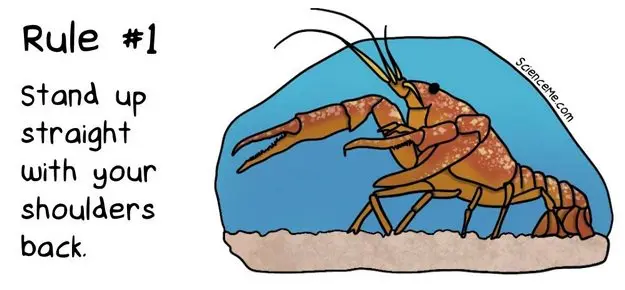
Why a lobster, though? Like humans, lobsters make dominance displays and have evolved social hierarchies. We also share similar neurochemistry due to our common evolutionary tree. The same logic applies when we trial cancer drugs on zebrafish. Non-scientists might find it absurd to compare mammals to molluscs, but there is simply no denying we share fundamental biology and behaviour.
Critics claim social hierarchies are merely a human construct for oppression. But evolutionary biology can confirm: natural selection supports the intrinsic value of social hierarchies through 500 million years of evolution.
In A Primate's Memoir: Love, Death and Baboons, Robert Sapolsky shares his observations of social hierarchies within baboon troops, and the disastrous psychological effects of being ranked last. His field studies have since informed valuable work into the neurobiology of stress and depression.
Rule #1. Stand up straight with your shoulders back.
Rule for Life #2. Treat Yourself Like Someone You're Responsible for Helping
People are better at giving medication to their pets than to themselves. Why do we fail so often to take proper care of ourselves?
This rule draws from depth psychology and the work of Carl Jung. Humans are self-conscious creatures. We understand emotional abstractions like shame, disgust, and mortality. And so we know ourselves to be tragically and fundamentally flawed.
This deep knowing impedes self-care, because we may feel we don't really deserve it. Note the self-destructive nature of drug and alcohol abuse. While it delivers short term pleasure, we all know that taking drugs to excess is horrendously bad for our bodies. Yet we do it anyway. We feel justified in administering the punishment we so deserve.
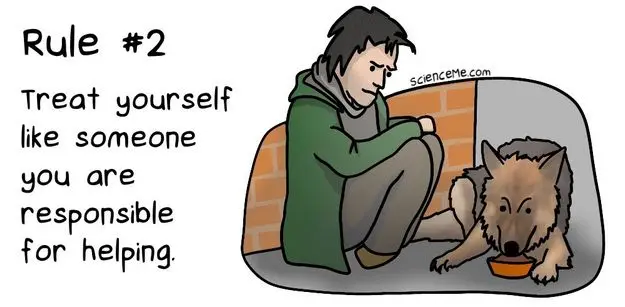
Jordan doesn't stop there. Highlighting our capacity for self-loathing is not practical life advice. He goes on to explain how we can overcome our personal pain by taking on outward responsibilities.
In dedicating yourself to a cause outside of your own problems, you create meaning in life. The cause can be anything—a hobby, a career, a charity, a community project. It just has to be a productive mission unrelated to your own trauma. In turn, taking care of yourself becomes a mere necessity toward achieving that external goal. Pretty slick, Jordy P.
Rule #2. Treat yourself like someone you are responsible for helping.
Rule for Life #3. Make friends with People Who Want The Best for You
Your social group is critical to your quality of life. These people reflect your nature back at you, day after day. They're your social barometer, helping you master what behaviour is acceptable in the world. When tragedy strikes, they help buffer you in grief, sadness, and terror.
Good friends tell you the truth, even when it hurts. They help navigate when you're lost. They encourage you to think deeper, take responsibility, and find personal meaning in life. Bad friends unfairly criticise and limit you. They restrict your intellectual and emotional growth. They use you to make themselves feel better. They don't really want you to succeed; if you did, you might not need them anymore.
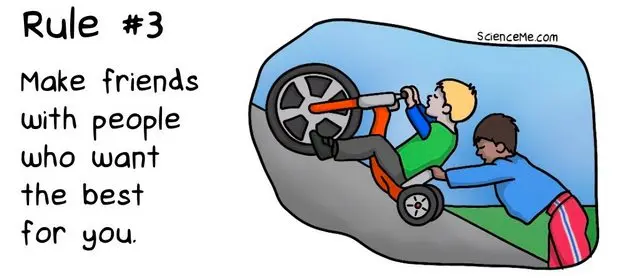
Choose your friends wisely. Cut the negative influences and the self-made victims who complain but don't actually want to change. They're a drain on your emotional resources and only want you to wallow with them. Seek positive, ambitious friends and help each other rise as high as you can go.
Rule #3. Make friends with people who want the best for you.
Rule for Life #4. Compare Yourself to Who You Were Yesterday, Not to Who Someone Else is Today
There will always be someone who's smarter, funnier, and having a better time in life than you. Social media reminds us of this continually, whether realistic or a carefully engineered façade. Don't compare yourself to other people (not least because your perception may be an illusion). Only compare your present self to your past self, thereby monitoring the trajectory that matters.
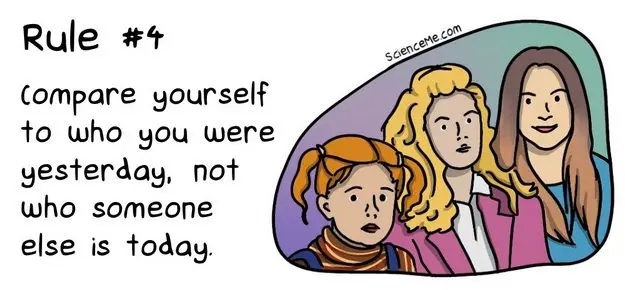
Set yourself realistic personal goals. What's befitting of your individual talents and interests? What do you see in the world around you that's broken—and how can you fix it? Search for meaningful ways to improve until you have definitive ambitions for your romantic, social, and vocational life.
Rule #4. Compare yourself to who you were yesterday, not to who someone else is today.
Rule for Life #5. Don't Let Your Children Do Anything That Makes You Dislike Them
As a psychologist and a parent himself, Jordan Peterson says parenting boils down to one thing: raising a human being who's competent and socially desirable. Coddling children provides short term gratification but actively harms their long term confidence, teaching them they need your protection to be safe. To compound the issue, parents won't always be around to buffer their adult children when they need it most.
Your child has a finite window of time in which to learn the boundaries of social behaviour. It closes around the time they start school, and discover a world of social independence. After this, society punishes them for their mistakes by denying them friendships, and later, relationships and career opportunities. The phrase "tough love" hinges on this idea.

What's more, a disobedient child can fuel resentment in even the most mild-mannered parents. It's in everyone's best interests to teach them the boundaries of acceptable behaviour at the earliest opportunity. Peterson recommends we set basic rules for our children and use the minimum force necessary to impose them.
Rule #5. Do not let your children do anything that makes you dislike them.
Rule for Life #6. Set Your House in Perfect Order Before You Criticise The World
It's easy to criticise others from a place of blissful ignorance. We can convince ourselves we could do a better job, without ever having been in that position of responsibility ourselves. Setting your own house in order provides hands-on experience of life's challenges. You may discover, for example, that there are no perfect solutions. Perhaps the target of your venom was actually doing a pretty good job all along.
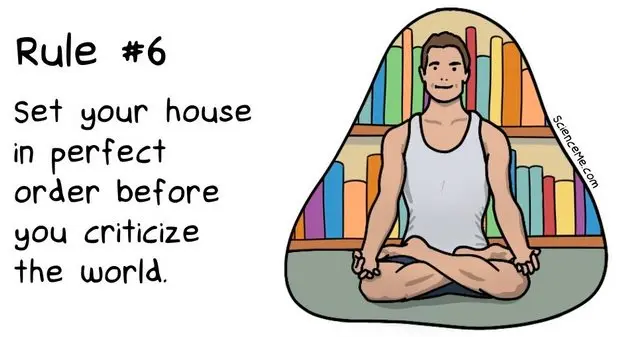
The principle of Chesterton's Fence illustrates this rule. Imagine a man walking along a country road when he discovers a fence. He has no idea why the fence is there, but he's a conservative chap, so he supposes it was put there for good reason. He leaves the fence well alone and takes a different route on his walk. Another man soon discovers the same unexplained fence blocking the road. This man is much more liberal-minded, and sees the fence only as a limit his freedom. He clears it away and trundles along the once-forbidden road.
What's the right course of action? It's impossible to know with the information we have. Perhaps the fence has outlived its purpose. Perhaps it was erected arbitrarily or with bad intent. Or perhaps the fence was blocking off a surprise sinkhole.
In real terms, Peterson cites people who demand political reforms without due consideration of the complex systems beneath. Without sufficient life experience, without demonstrating competency ourselves, we may be foolish enough to tear down imperfect systems only to replace them with something far worse.
Rule #6. Set your house in perfect order before you criticise the world.
Rule for Life #7. Pursue What is Meaningful (Not What is Expedient)
Jordan Peterson says we can cope with existential angst by actively pursuing a purpose that's bigger than ourselves. And he's spot on. Why do you think Elon Musk is obsessed with colonising Mars? Why did Jane Goodall spend years studying chimps in the forests of Tanzania?
Passion leads to purpose. Here, we transcend our trauma.
This mindset requires discipline and delayed gratification. It means doing the hard thing now to reap long term rewards. Peterson highlights meaning and reward in the big picture, and it filters down to the decisions we make in everyday life. Junk food vs healthy eating. Laziness vs exercise. Cheating vs commitment. It's a trade-off between your present self and your future self.
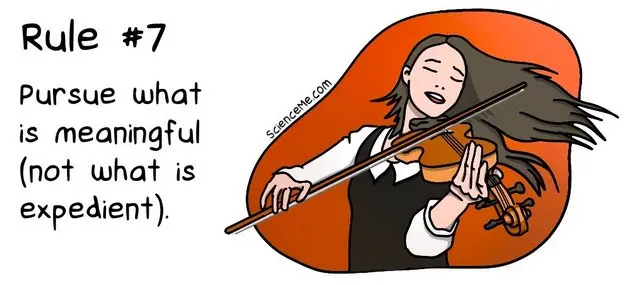
Have some integrity, define your values, and discover what makes your life worthwhile. When times get tough (and they will) you'll have sufficient inner strength to fight. But what exactly are we fighting? According to the depth psychologist, Carl Jung: it's the absolute terror of existence. It comes from loss and loneliness, from stress and disease. When life shatters you into a thousand pieces, what core pursuit will motivate you to put yourself back together?
Rule #7. Pursue what is meaningful (not what is expedient).
Rule for Life #8. Tell The Truth – Or, at Least, Don't Lie
Spend a full day monitoring your language. Many people find they lie a lot. Small lies or deliberate omissions can appease friends, bypass confrontation, or elevate social status. But what starts as minor deception can spiral into more dangerous lies and manipulations. Until we examine the fallout of this behaviour, many people lie freely up to the point they think they can escape detection. Are we really ok with this crooked, self-serving approach to others?
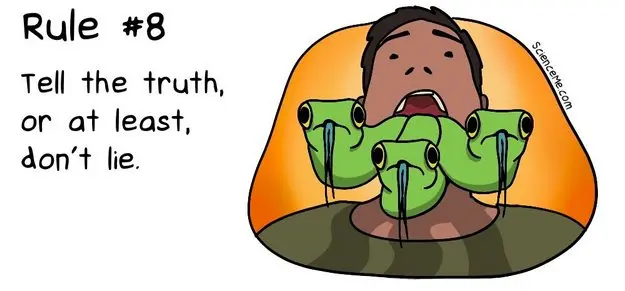
In his book, Lying, Sam Harris works through the consequences of deception to illustrate how all lies are ultimately harmful to ourselves and others. In The Invention of Lying, Ricky Gervais invents the concept of heaven for his dying mother, terrified of an eternity of nothingness, which brings chaotic societal consequences.
It's time to examine authenticity at every scale. Set yourself the meta-goal of being as accurate as possible when relaying your experience of the world. This gives you integrity. It doesn't mean you have to share every single thought that enters your mind. But whatever you do say should be truthful, and not misleading by omission. In turn, you'll tune in to authenticity amongst your peers (or lack thereof), helping you identify which relationships are trustworthy and valuable.
Rule #8. Tell the truth – or, at least, don't lie.
Rule for Life #9. Assume The Person You're Listening to Might Know Something You Don't
Most people are verbal processors: we need to talk in order to structure our thoughts. So as a listener, you help other people to think, to re-arrange their logic and opinions, and to problem-solve disequilibrium.
If you listen hastily with judgement, eager to assume the other person's position before they've finished their sentence, you risk making inaccurate assumptions. Good listening means devoting your entire attention to the speaker's message, even when you disagree with it.
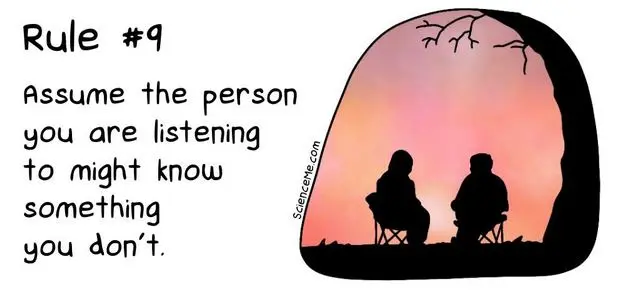
Next time you're in a conversation, focus on listening. Allow the other person talk for longer and without interruption. Ask more questions about how they think or feel. They'll reveal themselves in ways you may not have seen before. Your ambition as a listener is to ask open questions and then summarise the answers in response to distil their true perceptions. This is also what makes a productive argument. It's not about winning based on the limited information you have, it's about understanding the problem from every perspective.
Rule #9. Assume the person you are listening to might know something you don't.
Rule for Life #10. Be Precise in Your Speech
It's fair to say Jordan Peterson has a lot of experience with verbal conflict. He's seen many disintegrations of order into chaos, and found a major culprit in the imprecise communication and conceptualisation of our fears. Social media encourages these errors—being digital, decoupled from reality, and reduced to snippets of communication vulnerable to misunderstanding. It's no wonder we're all so riled up on Twitter.
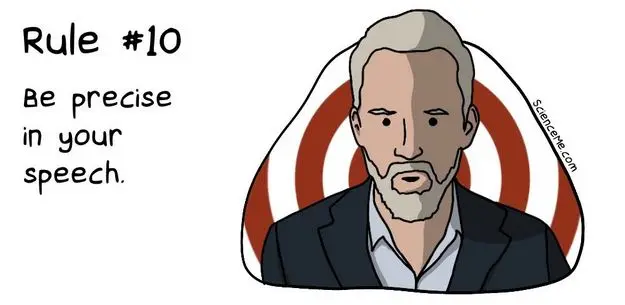
But we can take measures to preserve civil discourse. When you identify a problem with clear and careful language, you bring it to the fore as a viable, obedient object. You can work together to reduce the complexity of the issue and seek a logical solution. If the problem is vague and poorly defined, everything bleeds together into an indeterminable mess.
Bottling things up is just as bad: the pressure builds until it escapes in one almighty explosion, a mess of emotions and misconceptions left to brew. Articulation is vital as we tackle issues of increasing complexity today. Make your words work hard for you or the truth will crumble into chaos.
Rule #10. Be precise in your speech.
Rule for Life #11. Don't Bother Children When They're Skateboarding
"Of course it was dangerous. Danger was the point. They wanted to triumph over danger. They would have been safer in protective equipment, but that would have ruined it. They weren't trying to be safe. They were trying to become competent—and it's competence that makes people as safe as they can truly be." - Jordan Peterson
In well-functioning societies, competence is the major driver of success. If you have a brain tumour, you want the most competent brain surgeon to treat you. You don't care about their bank balance, or their political leanings, or their ethnic background. Competence is king.

Here, Peterson strikes at what Freud called the Oedipal Mother, who overprotects her children hopelessly. Her extreme compassion prevents them from striking out, making mistakes, and learning how to be self-sufficient physically, socially, and emotionally. Also known as the Devouring Mother, she foreshadows a lifetime of fear and insecurity for her offspring.
Children are little adults on a path to independence. You can't fight their battles for them and you can't make the whole world safe. Allow them to brave first-hand experience with all its inherent dangers. Then, as competent adults, they can fight their own battles and win.
Rule #11. Do not bother children when they are skateboarding.
Rule for Life #12. Pet a Cat When You Encounter One on The Street
In rule two, Peterson told us that we have a tendency to be wrapped up in our own painful, self-conscious existence. With empathy, this awareness extends to others, making it some degree of work to spend time with another human. But we do it anyway because we get social enrichment in return.
There's a good reason we like to keep pets. Non-human animals give us the comfort of companionship without the energy demands of human interaction. Sure, they don't deliver the highest levels of conversation, but that's not the point. Animals are the least demanding friends you'll ever have.
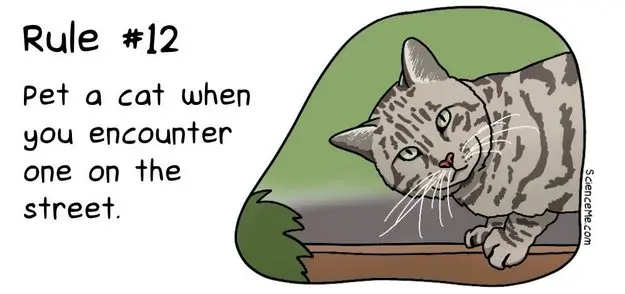
It's in these moments, meeting a cat in the street, that you forget about the acute and chronic stresses of your life, and can just be with another living creature. They don't judge you or force you to confront your terror. They just want to be with you. And that's absolutely life-affirming.
Rule #12. Pet a cat when you encounter one on the street.


Could The Last of Us Happen?
Is it really possible for Cordyceps fungi to evolve to infect humans and turn us all into naughty saprophytic zombies?

15 Popular Science Books
Reading is like dipping in another person's brain pool and swimming in their knowledge. There's only one rule: DON'T PEE IN THE POOL.

Viruses: Genes Gone Rogue
Viruses are essentially runaway genes, also known as intracellular parasites, mobile genetic elements, or freeloading gits.

How Does DNA Work?
DNA isn't just a blueprint for embryos. You're literally expressing your DNA right now, as if you have a clue what you're doing.

Neuralink and You
A Link is a coin-sized panel of microchips, a battery, and 3,000 electrodes along hair-thin neural threads. And it goes inside your skull.

Dogs Are Smarter Than You Think
Dogs have greater social intelligence than our closest primate cousins, thanks to living symbiotically with humans for 40,000 years.

A Man Walks into a Teleporter
He pauses for thought while it scans every molecule in his body, makes a digital copy, and proceeds to annihilate his physical body.

The Life of Elon Musk
So you have this dream of changing the world? For Elon Musk, this isn't enough. His ambitions are multiplanetary.